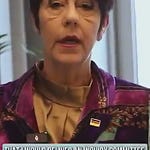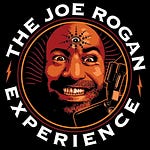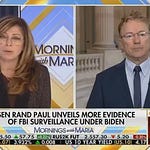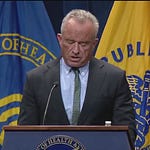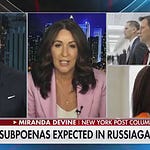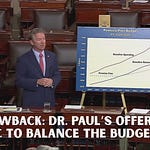Rand Paul Review is almost to 50k subscribers. Help RPR by upgrading and sharing this newsletter!
The Mirage of Modern Economics
Kurt Wallace sat down with Chris Rossini, co-host of the Ron Paul Liberty Report and a voice from the Rand Paul Institute, to unravel the tangled mess of America’s economic landscape. What emerged was a stark contrast between the principles of Austrian economics—rooted in individual liberty and free markets—and the corporatist, state-controlled reality we live in today. The discussion peels back layers of misunderstanding about capitalism, government intervention, and the elusive pursuit of human freedom.
Austrian Economics vs. the Statist Quagmire
Rossini wasted no time setting the stage. “Real economics,” he argued, “is free market, private property economics,” a philosophy crystallized by the Austrian school—not because it’s exclusive to Austria, but because its foundational thinkers, like Ludwig von Mises and Friedrich Hayek, hailed from there. This stands in opposition to the centralized planning championed by Keynesians, monetarists, and the Chicago school, who cling to mathematical models and the illusion that a handful of bureaucrats can steer an economy.
“Mathematics isn’t the problem,” Rossini clarified. “It’s the distortion—the false sense that central planners can control something as complex as human action.”
Austrian economics, by contrast, focuses on the individual—unpredictable, speculative, and free. Entrepreneurs guess what people want, take risks, and sometimes fail. That’s the market at work. Compare that to the “statist economics” Rossini decries, where government officials in “marble palaces” pull levers—raising minimum wages or tweaking GDP—only to pile problems atop problems.
The United States, Rossini contends, is nowhere near this free-market ideal.
“The government is involved in everything, every single industry, almost every product, the government is there somehow dictating”
Yet, the market’s resilience shines through. “It’s a miracle things still function,” he marveled, crediting the market’s inherent power to adapt despite suffocating interference.
Corporatism, Not Capitalism
Wallace pressed Rossini on the state of the U.S. economy, asking whether we’re truly capitalist, state corporatist, or Keynesian. Rossini’s answer was unequivocal:
“We live in a corporatist society.” Forget the muddy label of “capitalism”—what we have is a cozy alliance between big government and crony corporations, stitched together by the Federal Reserve’s monetary system. “That’s the lifeblood, the beating heart of the corporatist state,” - Rossini
The COVID-19 era exemplified this, with major corporations lockstep with government edicts—often proven wrong—while small businesses, like your local pizza shop, were left to fend for themselves. This isn’t new, Rossini noted, tracing it back to early 20th-century models like Mussolini’s Italy, where state and corporate interests fused. “We don’t have the ideologies of Hitler or Mussolini,” he added, “but economically speaking, it’s the same thing.”
When downturns hit, the refrain is predictable: “Too much freedom!” Rossini scoffed at the notion. “We don’t have anything close to that.” Instead, government doubles down, entrenching itself further—ironically worsening the messes it created.
Dispelling the Myth
How do you break through the myth that America is a capitalist beacon? Wallace referenced the Communist Manifesto’s fifth plank—a strong central bank—and tied it to the Federal Reserve Act and the 16th Amendment, which birthed income tax and centralized monetary control. Rossini pointed to history: America’s founding was “radically decentralized,” with states fiercely guarding their autonomy. Post-Civil War, that shifted. “Slavery was gone, but now everybody obeys D.C.,” he said. The result? A homogenized, corporatist sprawl where local flavor is drowned by federal overreach.
To explain this simply, Rossini emphasized freedom’s essence:
“It's best to have people make their own decisions as to what they want to buy, where they want to work.”
Government’s role? Punish violence, force, and fraud—then step aside. Today’s reality is the opposite, with the Fed’s counterfeit dollars fueling a system that prioritizes the connected few over the many.
The Fed’s Inflationary Scam
The Fed’s toolkit—printing money and fiddling with interest rates—devalues existing dollars, a hidden tax Ron Paul calls “egregious.” Using a Mickey Mantle rookie card analogy, Rossini illustrated: flood the market with a million more, and its value plummets. “That’s what happens when they counterfeit dollars,” he said. “Eggs are $10 because the money’s worth less—not because hens got greedy.”
Rossini echoed Senator Rand Paul’s quip:
“you can't borrow your way out of debt and you can't print your way out of prosperity.” - Rand Paul
Who benefits? The first recipients—banks, corporations, government cronies—spend the fresh cash before prices spike. The rest of us watch our purchasing power erode. “It’s fraud,” Rossini declared, “unconstitutional counterfeiting,” though the government shrugs off such constraints.
Tariffs and Trump’s Gambles
Wallace pivoted to Trump’s policies, notably tariffs and the speculative “gold card” immigration fee. Rossini was skeptical of tariffs, citing historical disasters like the Morrill Tariff (sparking the Civil War) and Smoot-Hawley (deepening the Great Depression). “Egos get involved,” he warned. “Trump says 25%, they retaliate, and it snowballs.” A better fix? Slash bureaucracy to lure businesses naturally—no trade wars needed.
The $5 million gold card idea—where immigrants or sponsoring firms pay to enter—drew a cautious nod. “Economically, it makes sense,” Rossini said. “If Apple thinks someone’s worth $5 million, they’re not a criminal.” A million such fees could net $5 trillion toward the debt. Still, he stressed citizenship’s deeper value—pride and assimilation—beyond mere economics.
Doge: A Flicker of Hope?
The Department of Government Efficiency (DOGE), a Trump-era initiative, aims to cut waste. Rossini praised its intent but doubted its impact if Congress keeps spending.
“Republicans are thumbing their noses at DOGE”
he said, citing a House bill bloated with deficits. Joni Ernst cheers empty buildings getting axed yet voted for $95 billion abroad. “We’ll know DOGE works when both parties are furious,” he quipped. So far, it’s just Democrats feeling the heat.
Empire’s Hidden Cost
Rossini’s sharpest critique targeted America’s global footprint: nearly 1,000 military bases across 70 countries. “Nobody else does this,” he said. “China has one.” The trillion-dollar “defense” budget props up an empire, not safety. Why? Maybe to enforce the dollar’s reserve status—Gaddafi and Saddam learned the hard way after bucking it.
“Close the bases,” Rossini urged. “Bring the troops home. That’s America first.”
Sound Money: The Ultimate Fix
Echoing Ron Paul, Rossini championed honest money—market-set interest rates and prices, not Fed dictates. Competing currencies, gold, or even crypto could counter the Fed’s monopoly, which “always fails the consumer.” But the will isn’t there. “They need the printing press,” he said of the elite. Public ignorance compounds the challenge, though Ron Paul’s decades-long crusade has sparked awareness.
“Honest money is the foundation of a free society,” Wallace concluded. “We’ve got a corrupt one now.”
A Call to Clarity
Rossini’s conversation with Wallace was a clarion call: America’s woes stem not from too much freedom but too little. Corporatism, inflation, and empire drain us, while solutions—deregulation, decentralization, sound money—linger out of reach. For Rand Paul Review’s audience, it’s a reminder: understand the system, challenge the myths, and fight for what’s real.
This podcast of The Kurt Wallace Show on RandPaulReview.com was recorded on February 26, 2025.





